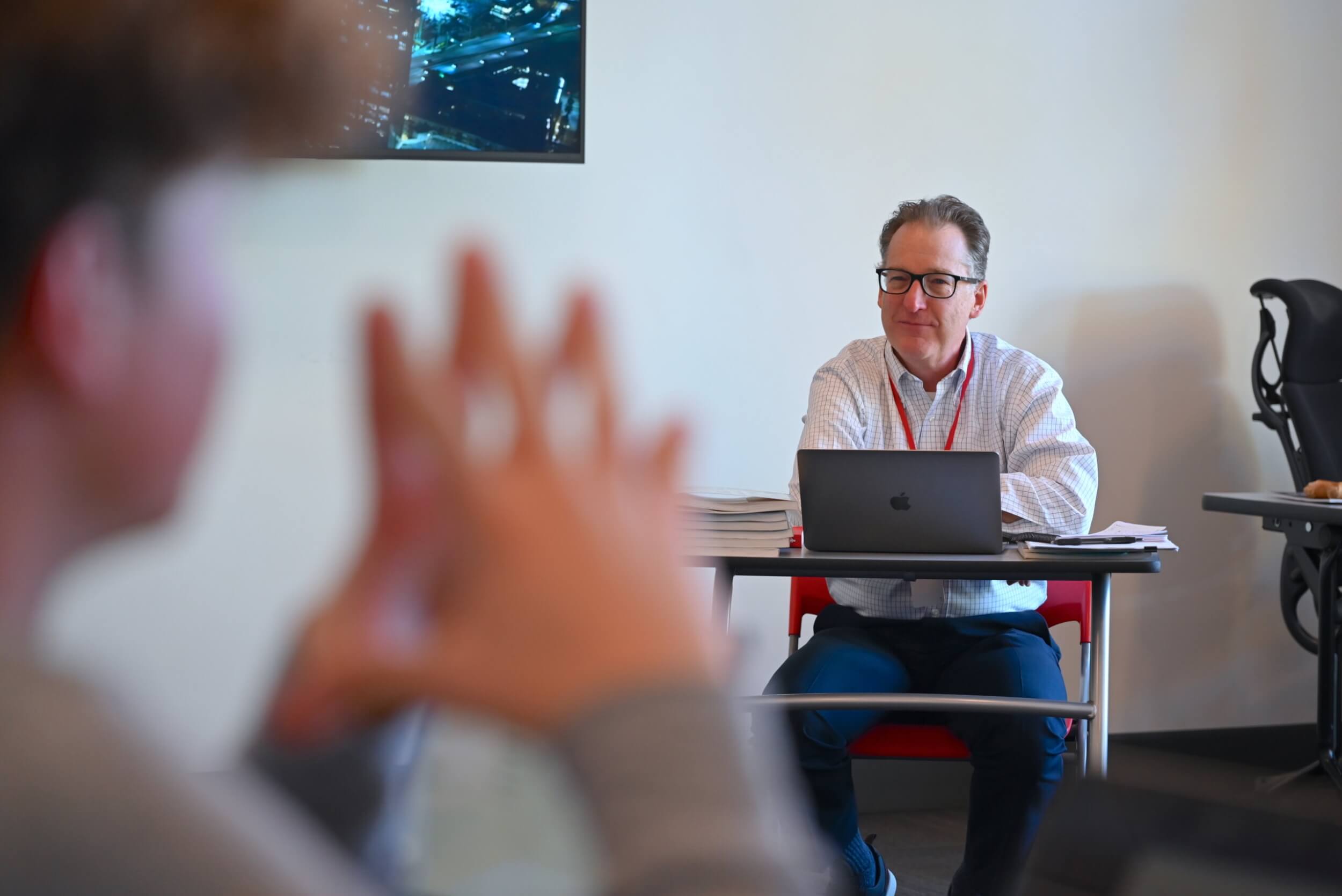Near the beginning of the 2023 fall trimester at Colorado Academy, English teacher Dr. Jon Vogels was preparing to introduce the students in his Advanced Studies and Research (ASR) course, Contemporary Literature of Israel, Palestine, and Lebanon, to the book Shrapnel Maps, by Arab American poet Philip Metres. His poems, which portray the lives of Palestinians and Israelis longing for justice, understanding, and peaceful coexistence, are the ideal introduction to the history underlying the works of fiction and poetry at the heart of Vogels’ class.
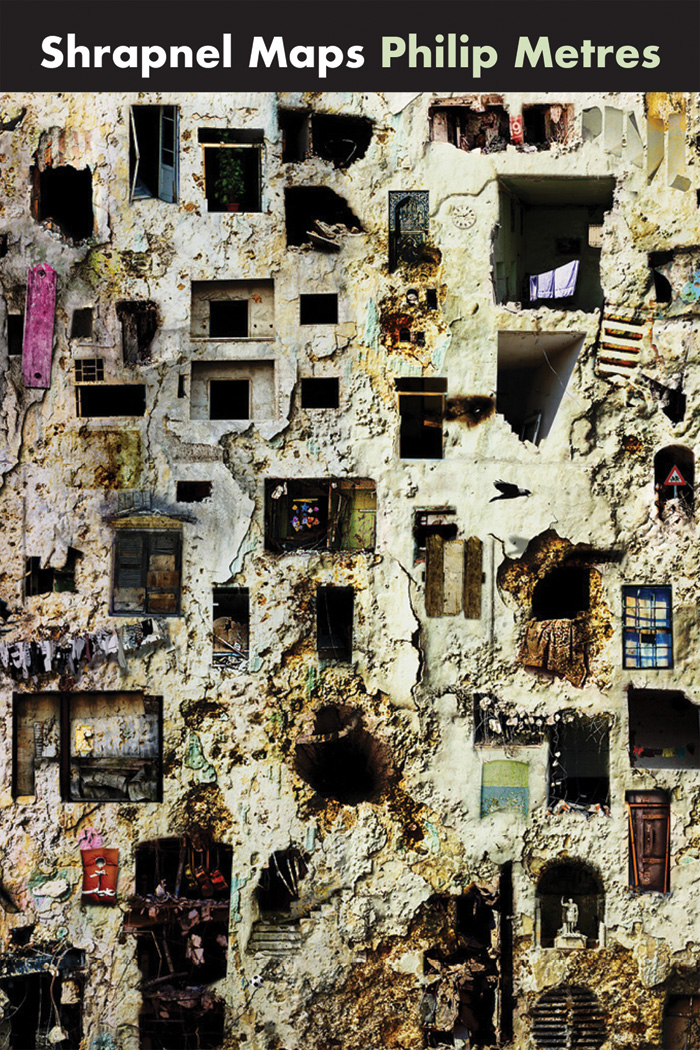
Then, on October 7, just a few weeks into the course, a series of coordinated terrorist attacks by the Palestinian group Hamas ignited a war with Israel that quickly escalated into the fiercest fighting between the bitter adversaries in 50 years. More than 1,000 Israelis were killed in the initial attacks, and Israel’s retaliation resulted in the deaths of more than 5,000 Palestinians and the evacuation of more than a million residents of the Hamas-controlled Gaza Strip.
“Well, this book might seem a little far-fetched now,” Vogels told his class of Metres’ meditations on peace soon after the hostilities began. But that kind of uncertainty, and a willingness to bend and flex as current events demand, has always been “part of the DNA of the course,” according to Vogels. “The works of literature we’re studying all originated after the Holocaust, so there’s a fundamental understanding that none of this is in the distant past. The history of this region continues to churn.”
That there are no easy answers is one of the core principles of Contemporary Literature of Israel, Palestine, and Lebanon. It is also one of the tenets upon which CA’s ASR approach was built.
ASR courses—offered in English, Social Studies, Computer Science, and Visual and Performing Arts Departments—go beyond traditional Advanced Placement (AP) studies, and are designed to give students more agency and the space and encouragement to rigorously pursue multidisciplinary questions that connect to the broader world. “The starting point in my course, just like in many of the ASR offerings, is that this is a highly complicated, highly contentious field of study,” Vogels explains. “Everything in the region we’re looking at—borders, religion, global influence—has been contested for thousands of years.”
Delving into recent literary works produced against this backdrop allows students to peer into history and culture through the immediate experiences of individuals and families—one story at a time. “The best we can do,” continues Vogels, “is explore as many viewpoints as we can through literature that puts us on the scene.”
Seeing Through the Fog of War
At the same time, Vogels must continually adapt planned class discussions by incorporating the latest news from the region, where each day brings fresh reports of military actions and civilian casualties, along with accusations from every quarter. He often devotes 15-20 minutes at the start of the 80-minute class for a recap of the latest developments.
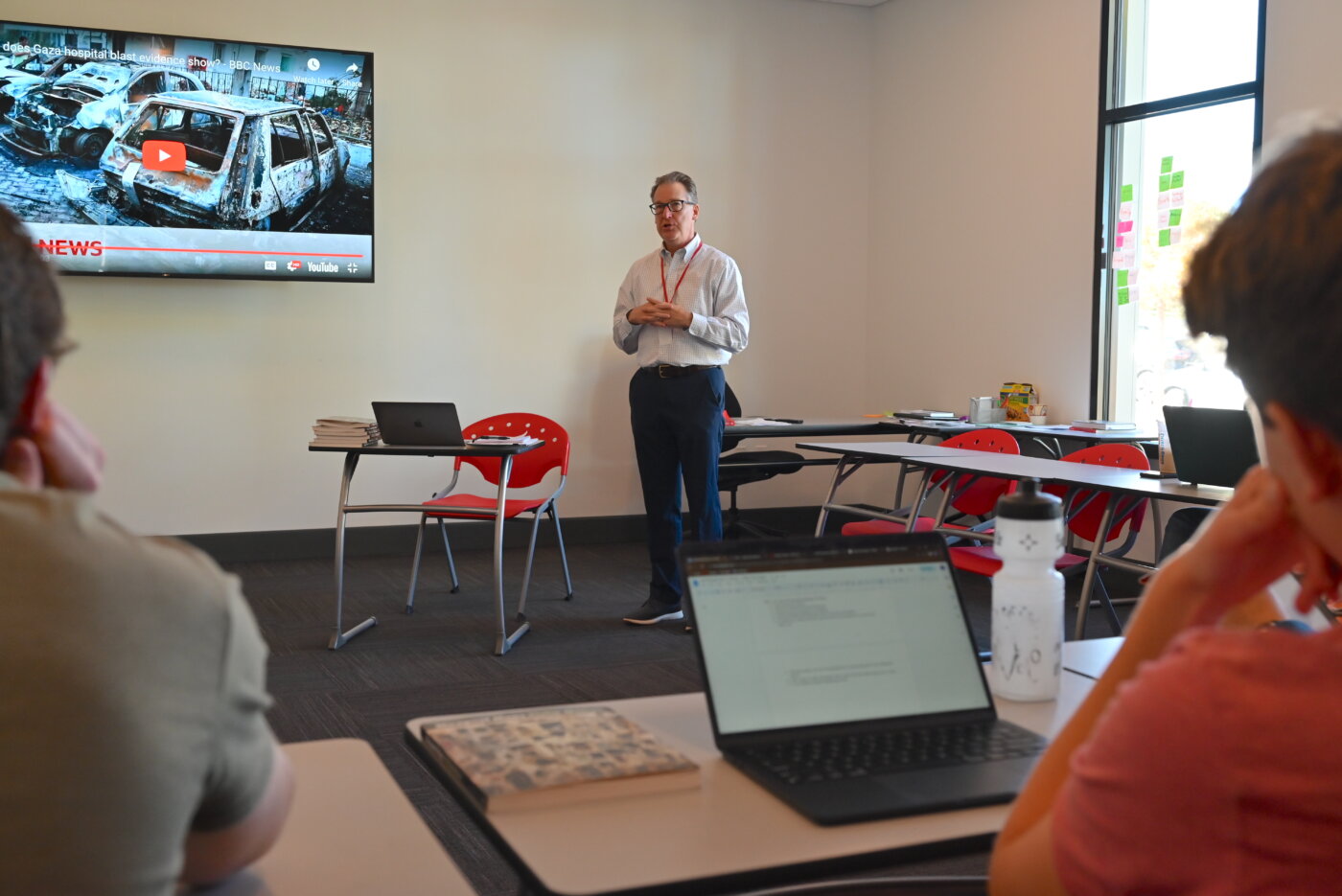
One morning, students watch a video news segment from the BBC about a blast that is reported to have killed hundreds of people sheltering at a Palestinian hospital; news organizations had been issuing frequent updates providing new details about the explosion and shifting blame between Israel’s military and the Palestinian Islamic Jihad.
Senior Logan Day-Richter observes, “This is clearly a humanitarian crisis that both sides are attempting to use for political firepower.”
Vogels agrees, “There’s such a desire for the media to say something immediately about the war that much of the reporting is rough, leaving us to sort out competing information.” And amidst the “fog of war,” he goes on—the uncertainty in situational awareness experienced by participants in military operations—determining culpability and intent becomes even more difficult.
Junior Aziza Diallo is concerned that people in the West will conflate Hamas, the political and military organization governing the Gaza Strip, with the Islamic Jihad, a paramilitary group supported by Iran’s anti-Israel government as well as Syria and Lebanon’s Hezbollah. “With those kinds of ties,” she wonders, “could the involvement of the Islamic Jihad grow into a much larger problem in the region?”
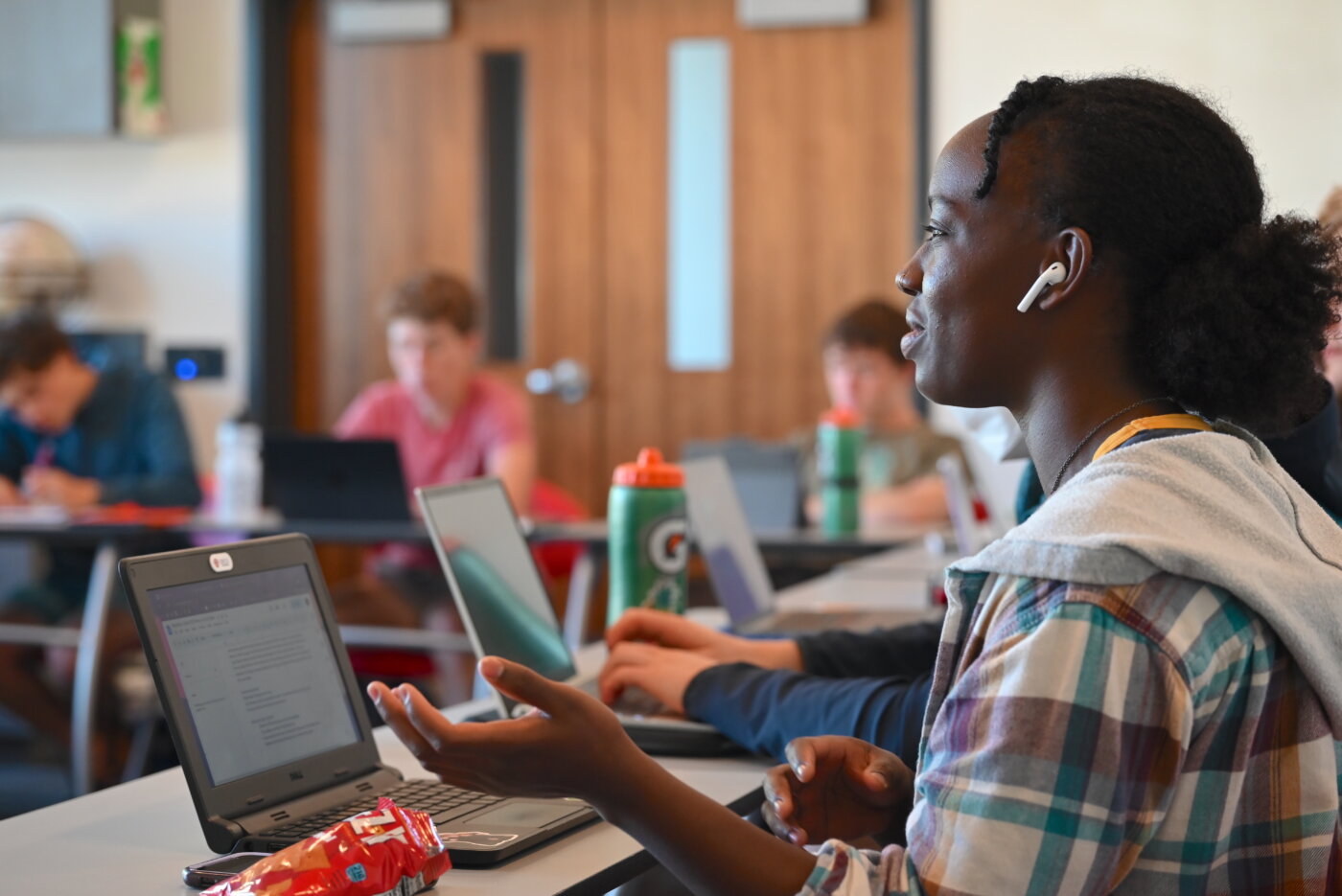
As the discussion illustrates, a few minutes of news, or even a couple of bullet points on the syllabus, can turn into lengthy political explorations. “My students like the extra time to be able to go in deep on things that are interesting, and not feel like we have some set agenda we have to get through”—for example, to prepare for an AP test, Vogels notes. “There’s comfort and excitement for them in knowing that everyone here is into it to the same degree. They’re not afraid to try on new ideas out loud; there are never any dead ends in the discussion.”
The two-trimester ASR course, he continues, allows him and his students to do justice to a complicated field of study that in the past would have been more challenging to dig into, whether through AP or a one-trimester Honors elective. Time for research at the University of Denver, which has a strong Middle East program, is built into the final weeks of the course, when students will produce their own original works of scholarship on a topic of their choosing.
“I think a lot of people are intimidated by this region of the world,” observes Vogels. “They feel it’s too complicated, there’s always conflict, or the history is overwhelming.” But ideally, his course will give students a deep understanding of the critical issues at stake and encourage them to stay abreast of what’s happening “in an enlightened way.”
“I want them to have a sense that they can roll up their sleeves and successfully deal with complex material,” Vogels says. “And then, when they get to college, they can look at something new and challenging and say, ‘Oh yeah, I can do that. I’ve done that before.’”
A Different Kind of Rigor
ASR courses such as Contemporary Literature of Israel, Palestine, and Lebanon feel like an inevitable extension of CA’s Upper School programming in the humanities.
During Ninth and Tenth Grades, students receive a sturdy and wide-ranging foundation in literature and political thought. The long-running courses Coming of Age in the World—an English Department staple in which students develop critical thinking and writing skills by studying global texts—and Global Perspectives—a Social Studies Department required course that purposefully draws connections between the past and the present—build their capacity for questioning simplistic answers to the world’s most pressing concerns.
As Juniors and Seniors, notes Vogels, students are developmentally ready for much more, and the program opens up significantly. “We give them a lot of choices,” he says, “and the scope widens for them to explore the true complexities of contemporary issues and areas of study.”
Vogels continues, “At CA, we’ve always been good at asking ourselves if we could be doing more. I think ASR is building a different kind of academic rigor, redefining what it means to be a really serious high school scholar. And our students take pride in being part of that.”
The courses, too, play to the strengths of CA’s faculty, whose deep resumes as educators and scholars mean that they are experts at translating their knowledge and excitement into engaging experiences for students.
“We are lucky to have some incredibly smart people teaching in the Upper School,” Vogels notes understatedly. “Tapping into their interests can generate any number of wonderful courses that spur the kind of intellectual growth we hope to see in our Juniors and Seniors.”
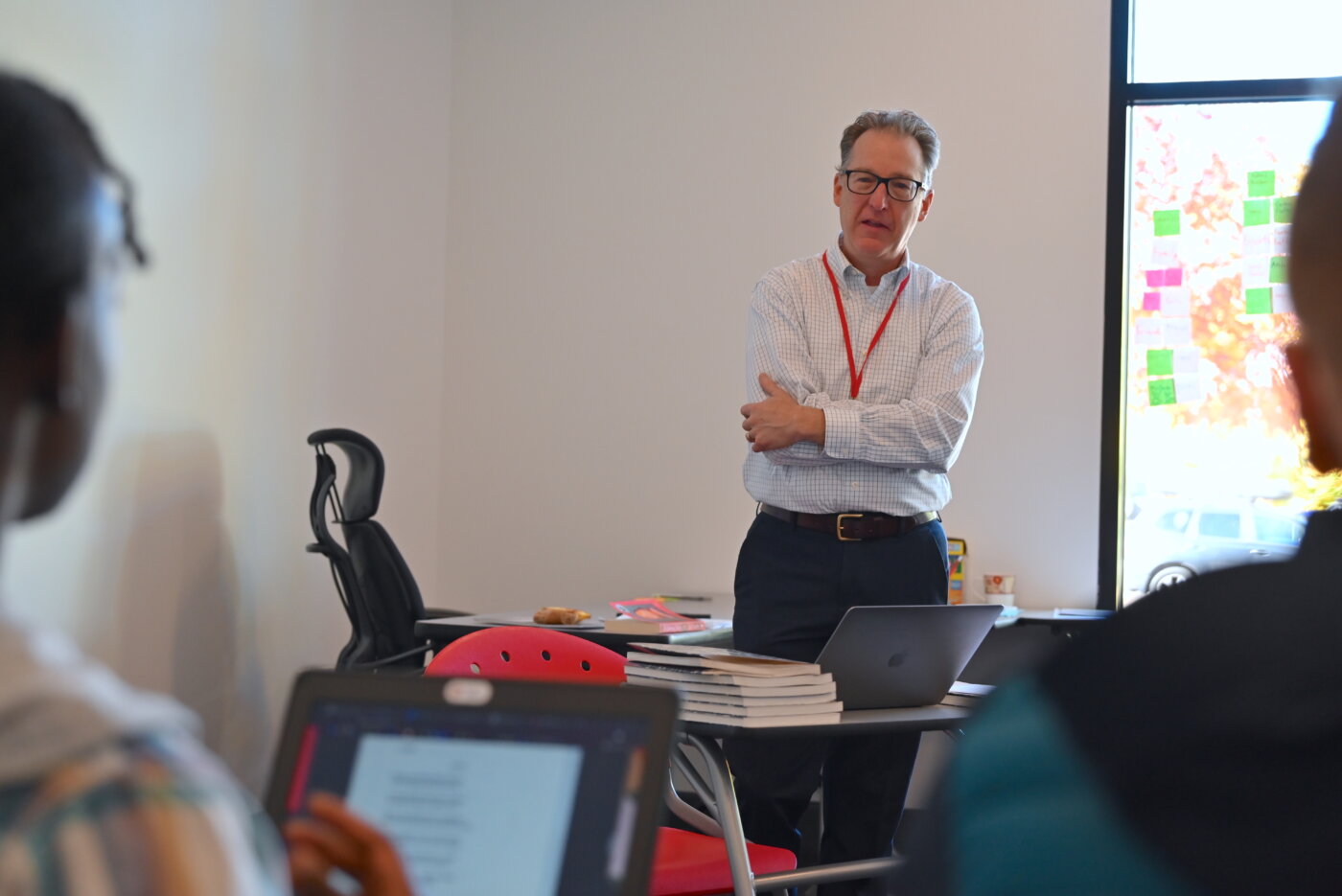
In Vogels’ 20 years at CA, first as Upper School Principal and now as English and Speech & Debate teacher, he has seen education—and the world—change dramatically. “Now, we are preparing our students for a future that we can only imagine,” he has said. “To do that, above all, they need to leave us possessed of the ability to navigate complex interactions that reach across all boundaries and disciplines.”
ASR, it seems, is one answer to that all-important challenge.
